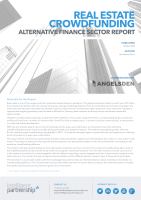
 www.intelligent-partnership.com
www.intelligent-partnership.com
Real Estate Crowdfunding
, ,Alternative Finance Sector Report - October 2014
7
REAL ESTATE CROWDFUNDING
ALTERNATIVE FINANCE SECTOR REPORT
PUBLISHED
October 14
AUTHOR
Samantha Goins
Diversification Benefits of Real
Estate
Modern portfolio theory tells us that to
decrease risk investment should spread
across several uncorrelated assets.
Global mainstream financial markets
are becoming increasingly correlated
and effective diversification is difficult
to achieve. Real estate is not entirely
removed from the financial markets,
especially in periods of austerity or
recession, but can provide a number
of diversification qualities. Prices and
occupancy rates do fall and experience
periods of volatility, however property
is a physical asset and a long-term store
of wealth. The recommended allocation
to real estate for an equity-oriented
portfolio is 20%
12
.
David Swensen Asset Allocation Model
In addition, real estate has also
traditionally been a very good hedge
against inflation. It can benefit from
capital growth and regular income with
returns often outperforming inflation,
providing a real return on investment.
Risks Unique to Crowdfunding
The risks to consider with crowdfunding
include the total loss of investment, lack
of regulation and liquidity.
Many countries are struggling to create
regulation and policy changes fast
enough to accommodate the evolving
world of alternative finance. The US and
UK have both created new regulation
with the objectives of better protecting
consumers without hindering deal flow
and have both restricted investment for
ordinary retail investors who do not have
a high capacity for loss. Where there
are no regulations in place, consumers
should be wary of poorly structured
platforms that do not segregate client
money, do not have any capital adequacy
requirements or do not have business
continuity plans in place if the platform
goes out of business.
Although some platforms offer a
provision fund if the borrower defaults
and doesn’t repay their loan, many still
do not. In the unfortunate event of a
complete company failure the possibility
of zero returns is very real. Some
investments are asset backed and if a
failure unfortunately occurs, selling the
underlying asset may recoup some of the
initial capital, but there is no guarantee
that the assets will be sufficient to recoup
the initial investment.
In addition, the lower levels of scrutiny in
the crowdfunding model mean that there
is an increased risk of fraud or failure as
scams or poor quality projects find an
easy route to market.
Finally liquidity will always be a risk,
particularly as there is currently no
established secondary market for real
estate crowdfunding investments.
However, this situation is likely to improve
over time as wider and deeper secondary
markets are established.
Mitigating the Risks
There are several ways to mitigate the
risks when investing in real estate through
a crowdfunding platform. The first would
be to choose a reputable platform,
which is preferably regulated and carry
out due diligence on the underlying
investments. The stricter the rules and
criteria imposed by platforms the better
the investments listed there are likely to
be. It is not enough to trust the platform
alone, investors should undertake their
own research and due diligence and
only invest in projects that they are
comfortable with and fully understand.
Platforms will have certain processes
in place to further protect consumers,
particularly in the UK and US where
crowdfunding is covered by new
regulation. If the platform fails they must
have a process in place to pass on equity
investments to experienced managers,
and to ensure the ongoing administration
of debt based investments. Many
platforms will hold the investment in trust
or beneficially on behalf of the investor,
and to ensure it is kept separate from the
assets of the platform.
Crowdfunding platforms do not offer any
recourse (to financial services protection
schemes) for investors if the investment
fails, but asset-backed investments
can mitigate the risk of a total loss as
underlying assets will be sold to repay
investors. Some platforms even have
a provision fund to protect investors if
the borrower defaults, but this is not
mandatory.
Diversification across several properties
can enable investors to create a well-
balanced portfolio which is suitable and
meets their needs. They can mitigate the
risk of a total loss by offsetting riskier
investments against solid asset-backed
opportunities. The minimum investment
seen with crowdfunding means
investors can diversify across several
properties which wouldn’t be possible
with traditional real estate investment
opportunities.
Domestic Equity
Foreign Developed Equity
Emerging Market Equity
Debt
Equity
Co-Invest
Real Estate
US Treasury Bonds
US Treasury Inflation -
Protected Securities
30%
15%
5%
15%
15%
20%
40%
38%
23%
12 -
https://www.realtymogul.com/blog/asset-allocation-in-real-estate















